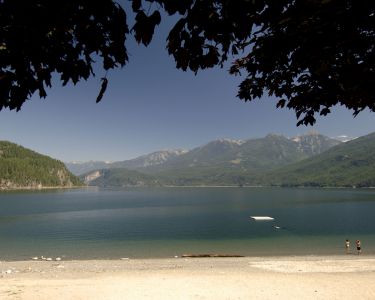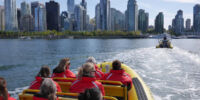
Details from the BC Government Release below:
British Columbians are being asked to take precautions this week, as Environment Canada has issued another heat warning for most of the province.
The extreme heat is predicted to last from Wednesday, July 28 to Saturday, July 31.
“Extreme heat is dangerous and can have devastating and deadly consequences,” said Adrian Dix, Minister of Health. “Health authorities and BC Emergency Health Services are preparing to assist people in need during the heat wave. British Columbians must also make any necessary preparations ahead of time and take steps to ensure the safety of yourself and your loved ones.”
Mike Farnworth, Minister of Public Safety and Solicitor General, said, “British Columbians should be vigilant, watch for warnings and take steps to stay safe during extreme heat. Follow health advice and call for emergency help if you need it.”
Environment Canada notes the higher-than-normal temperatures will provide little relief at night, with elevated overnight temperatures, increasing the risk of heat-related illnesses.
“It is important to be aware of and follow the health guidelines provided to keep your body cool while temperatures outside rise,” said Dr. Bonnie Henry, provincial health officer. “This includes limiting physical activity outdoors, finding a cool, air-conditioned place and keeping hydrated, and taking extra care to check in with people most at risk, including infants and young children and older people.”
During heat alerts, the Province works together with health authorities and local governments to take action to protect people and communities. Health-authority declarations trigger responses in affected regions, including the opening of cooling centres by local authorities, focused action throughout the health-care system with targeted support for vulnerable British Columbians, including seniors, and support for local communities and First Nations through Emergency Management BC.
HealthLink BC has these tips for keeping cool and healthy:
- Drink plenty of fluids. Drink extra water even before you feel thirsty and if you are active on a hot day. Ask your health-care provider about how much water you should drink on hot days if you are on water pills or limiting your fluid intake.
- Keep cool. Stay indoors in air-conditioned buildings or take a cool bath or shower. At temperatures above 30 C, fans alone may not be able to prevent heat-related illness. Sunscreen will protect against the sun’s ultraviolet (UV) rays, but not from the heat.
- Plan activity before 10 a.m. or after 4 p.m., when the sun’s UV radiation is the weakest.
- Avoid tiring work or exercise in hot, humid environments. If you must work or exercise, drink two to four glasses of non-alcoholic fluids each hour. Rest breaks are important and should be taken in the shade.
- Avoid sunburn: Use a broad-spectrum sunscreen with SPF 30 or higher on exposed skin and an SPF 30 lip balm, and reapply often.
- Wear lightweight, light-coloured, loose-fitting clothing and a wide brimmed hat, or use an umbrella for shade.
- Never leave children alone in a parked car. Temperatures can rise to 52 C within 20 minutes inside a vehicle when the outside temperature is 34 C. Leaving the car windows slightly open will not keep the inside of the vehicle at a safe temperature.
- Regularly check older adults, children and others for signs of heat-related illness, and make sure they are keeping cool and drinking plenty of fluids. Check on those who are unable to leave their homes and people with emotional or mental-health challenges whose judgment may be impaired.
- Heat also affects pets. Never leave a pet in a parked car. Limit pets’ exercise, and be sure to provide them with plenty of water and shade.
Home treatment for mild heat exhaustion may include:
- moving to a cooler environment;
- drinking plenty of cool, non-alcoholic fluids;
- resting; and
- taking a cool shower or bath.
If symptoms are not mild, last longer than one hour, change, worsen or cause concern, contact a health-care provider.
Elevated heat also increases the risk of wildfire, and British Columbians are urged to do their part to prevent human-caused wildfires and help keep communities safe. To report a wildfire, unattended campfire or open burning violation, call 1 800 663-5555 toll-free or *5555 on a cellphone.
Learn More:
Environment Canada Public Weather Alerts for B.C.: https://weather.gc.ca/warnings/index_e.html?prov=bc
HealthLink BC online resources about beating the heat: https://www.healthlinkbc.ca/health-feature/beat-the-heat
And heat-related illness: www.healthlinkbc.ca/healthlinkbc-files/heat-related-illness
And heat stroke symptoms: https://www.healthlinkbc.ca/health-topics/sig245455
And warm weather safety in a time of COVID-19: http://www.bccdc.ca/about/news-stories/stories/2020/warm-weather-safety-in-a-time-of-covid-19
To ask about heat-related illness, call HealthLink BC at 811.
BC Wildfire Service: www.bcwildfire.ca
Fire restrictions and bans: https://www.gov.bc.ca/wildfirebans
FireSmart program: www.firesmartbc.ca
PreparedBC: www.preparedbc.ca/wildfires
Read the full release: https://news.gov.bc.ca/releases/2021HLTH0136-001486
Media Contact:
Ministry of Health
Communications
250 952-1887





